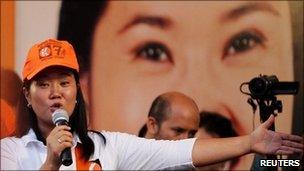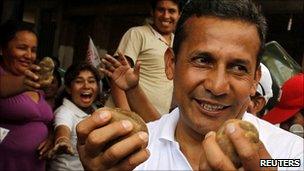Peru election run-off: Candidate profiles
- Published
Peru's presidential run-off votes takes place on 5 June between Keiko Fujimori and Ollanta Humala.
They led the field after the first round on 10 April but neither secured more than 50% to win outright.
Whoever is elected will success Alan Garcia, who cannot stand for a second term.
Keiko Fujimori
Keiko Fujimori, 36, is the daughter of controversial former President Alberto Fujimori, who led Peru for a decade from 1990 until he fled into exile in the face of a corruption scandal.

Keiko Fujimori would, if elected, be the country's first female president
Regarded by many as an authoritarian strongman who trampled Peru's democracy, he is now serving a 25-year jail sentence for bribery and ordering death squads to kill suspected Maoist rebels.
Keiko Fujimori has defended her father's record in defeating the Shining Path rebels and saving Peru from hyperinflation and economic collapse, and has the backing of his remaining supporters.
Like her father, she supports free market economic policy and advocates a tough approach to crime.
She has promised to improve social programmes and expand infrastructure in poor areas.
In 1994 at the age of 19, Keiko Fujimori became Peru's First Lady after her father and mother separated, and in 2006 she was elected to congress.
If she wins the election, Ms Fujimori would be Peru's first female president.
Critics say her main aim is to secure a pardon for her father - which she denies.
Ollanta Humala
Left-wing nationalist Ollanta Humala, 48, first came to prominence in 2000 when he led a short-lived military rebellion against then-President Alberto Fujimori.

Ollanta Humala has strong support among poorer Peruvians
In 2006, the former army colonel came second in the presidential election run-off to Alan Garcia.
His left-wing views won widespread support among Peru's poor majority, but worried the upper and middle-classes and led some to compare him to Venezuela's Hugo Chavez.
This time he has adopted a more moderate stance, warning Mr Chavez not to interfere and emphasising instead a desire to emulate Brazil's governing Workers' Party.
"Peru has changed and I've changed," he has said.
He says he would expand the state's role in the economy and extract higher royalties from mining companies that account for more than half Peru's exports, and use the money to reduce poverty.
His humble background and indigenous looks give him strong appeal to ordinary Peruvians.
His critics worry he would move Peru in a more populist, authoritarian direction and damage the economy.
Mr Humala has been accused of committing human rights abuses during the fight against Shining Path rebels in the 1990s when he was an army captain, but he has denied the allegations.